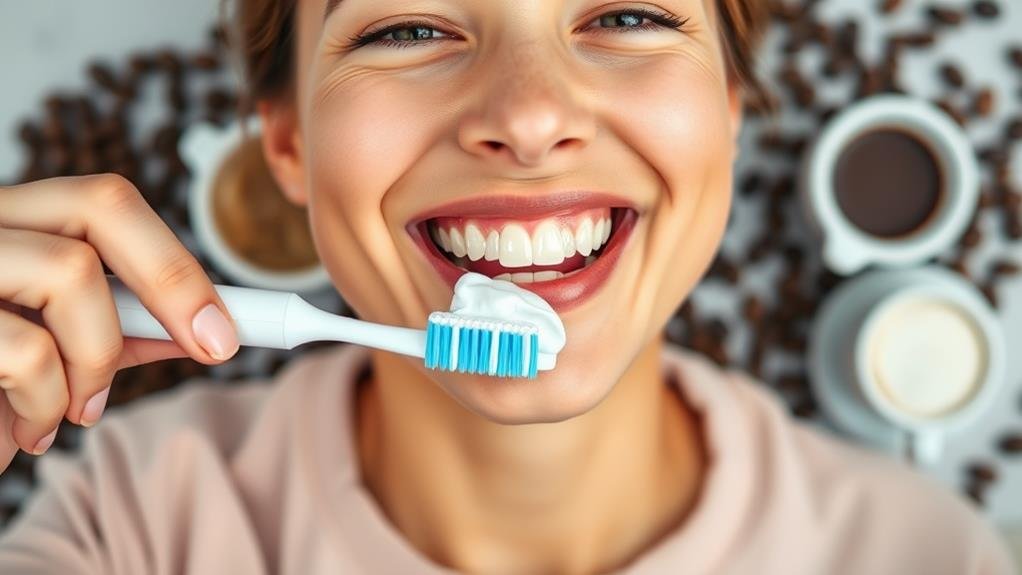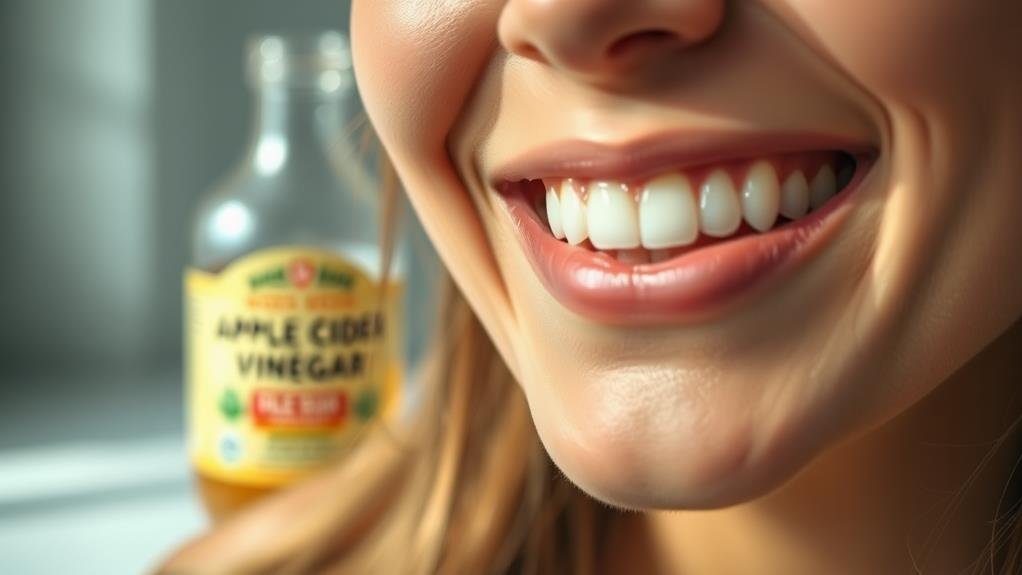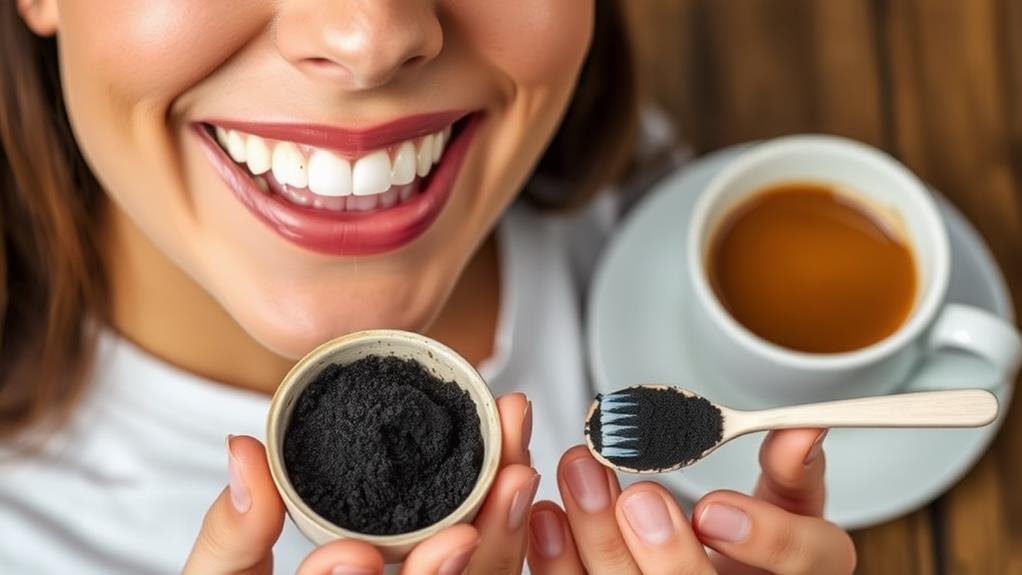If you're worried that removing coffee stains from your teeth means shelling out for expensive treatments, think again. Regularly brushing and flossing can make a significant difference, but there are even more effective natural methods to explore. For instance, using whitening toothpaste with baking soda or hydrogen peroxide can help brighten your teeth without harsh chemicals. But what about other options? From apple cider vinegar to oil pulling with coconut oil, there are several gentle yet efficient ways to eliminate coffee stains and promote healthier teeth and gums. Let's explore these methods further to see just how well they work.
Brushing & Flossing Regularly

When it comes to removing coffee stains from your teeth, one of the most effective and straightforward methods is brushing and flossing regularly. Brushing your teeth at least twice a day helps in removing coffee stains and preventing discoloration. Incorporating natural cleaning options, such as cleaning your coffee maker regularly, can also prevent buildup that contributes to coffee stains on teeth. Using whitening toothpaste that contains baking soda or hydrogen peroxide can enhance this process by helping to eliminate surface stains more effectively.
In addition to brushing, flossing is essential. It allows you to clean between your teeth, where coffee can leave behind plaque and contribute to staining. Flossing or using an interdental brush daily can remove this plaque and maintain the overall health and whiteness of your teeth.
Consistent oral hygiene is key in preventing and reducing coffee stains. By incorporating regular brushing and flossing into your routine, you can help maintain the brightness of your teeth over time. This simple yet effective approach guarantees that your teeth remain clean and free from the discoloring effects of coffee. By making these habits part of your daily routine, you'll be better equipped to keep those pesky coffee stains at bay.
Baking Soda and Hydrogen Peroxide
One of the most effective natural methods for removing coffee stains from your teeth involves using baking soda and hydrogen peroxide. This combination is a powerful tool in your quest to keep your teeth clean and stain-free.
Baking soda acts as a mild abrasive, helping to scrub away coffee stains from the surface of your teeth. When combined with hydrogen peroxide, which helps break down and remove stubborn stains, you get a paste that is highly effective at removing coffee stains naturally.
Here's how you can use this method:
| Ingredient | Action | Benefit |
|---|---|---|
| Baking Soda | Mild Abrasive | Scrubs away stains |
| Hydrogen Peroxide | Breaks down stains | Removes stubborn stains |
| Paste | Combines both ingredients | Powerful stain-fighting agent |
| Moderation | – | Gentle on enamel, gradual lightening and brightening |
When used in moderation, this natural remedy is gentle on tooth enamel. Regular use can gradually lighten and brighten teeth that have become discolored by coffee consumption. This stain-fighting paste is an excellent addition to any oral hygiene routine, offering a natural and effective way to remove coffee stains.
Using Apple Cider Vinegar

After exploring the effectiveness of baking soda and hydrogen peroxide, it's worth considering another natural method for removing coffee stains: using apple cider vinegar. This natural remedy is a cost-effective and efficient way to combat coffee stains on your teeth. Additionally, you can enhance your oral care routine by incorporating homemade solutions, such as customizing coffee creamer to avoid excess sugar that can contribute to staining.
To use apple cider vinegar, mix it with warm water. Swish this solution in your mouth for about 30 seconds to help break down and remove stubborn stains. The acidity in the vinegar helps dissolve the tannins in coffee that cause the stains, making it easier to clean your teeth.
After swishing the solution, be sure to rinse your mouth thoroughly with water to avoid any lingering residue. This step is essential to maintain good oral health and prevent any potential side effects from the vinegar.
Apple cider vinegar is a popular choice for its natural stain removal properties and overall oral health benefits. It's a simple and effective way to keep your teeth looking their best without resorting to expensive dental treatments or harsh chemicals. By incorporating apple cider vinegar into your oral care routine, you can keep those pesky coffee stains at bay while promoting healthier teeth and gums.
Oil Pulling With Coconut Oil
Oil pulling with coconut oil is another effective natural method for eliminating coffee stains from your teeth. This simple technique involves swishing a tablespoon of coconut oil in your mouth for 15-20 minutes. The antimicrobial properties of coconut oil help eliminate bacteria and plaque that contribute to teeth discoloration from coffee, making it an ideal way to lessen coffee stains.
By incorporating coconut oil pulling into your routine, you can not only lighten coffee stains but also enhance your overall oral health. This practice reduces bad breath by eradicating harmful bacteria and promotes gum health, contributing to a healthier mouth environment. The natural cleansing effect of coconut oil guarantees that your teeth and gums receive a gentle yet effective treatment without harsh chemicals or abrasive ingredients.
Regular oil pulling with coconut oil is a secure method that gradually lightens coffee stains on your teeth while providing a natural cleansing effect. It's an easy and non-invasive way to uphold better oral hygiene and decrease the impact of coffee consumption on your dental appearance. By making this practice part of your daily routine, you'll be on your way to a healthier, brighter smile.
Activated Charcoal Remedies

If you're seeking an alternative natural approach to eliminate coffee stains from your teeth, consider using activated charcoal. Activated charcoal possesses a porous surface that effectively attaches to toxins and stains on teeth, rendering it a safe and efficient tool for natural whitening. It is particularly adept at absorbing coffee stains and other discolorations, aiding in the maintenance of a radiant smile by eliminating surface stains.
When utilizing activated charcoal for teeth whitening, it is crucial to utilize it in moderation. Although it is safe for oral use, excessive use may potentially erode your enamel. To prevent this, apply the activated charcoal powder to your teeth gently using your finger or a soft-bristled toothbrush. Allow it to remain on for a few minutes before thoroughly rinsing.
Before integrating activated charcoal into your routine, it is advisable to seek advice from a dentist to confirm its compatibility with your teeth. This precautionary measure helps in averting any potential issues and securing optimal outcomes. Through proper application, activated charcoal can aid in maintaining your gleaming white teeth without abrasive chemicals. Regular utilization can amplify the inherent teeth whitening properties of activated charcoal, rendering it a valuable inclusion in your oral care regimen.
Conclusion
By incorporating these natural methods into your daily routine, you can gradually transform your smile from dull and stained to bright and vibrant. Imagine the confidence boost of flashing a pearly white grin every time you smile. Regular brushing and flossing, combined with occasional apple cider vinegar rinses, oil pulling with coconut oil, and activated charcoal treatments, will keep coffee stains at bay and leave your teeth feeling smooth and looking radiant. Give your mouth the TLC it deserves—it's worth the effort

